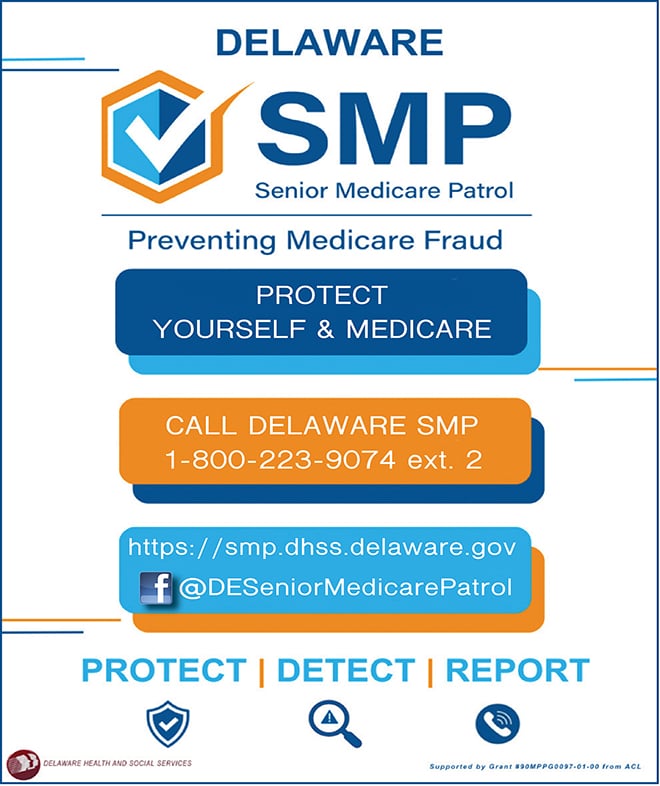Common Medicare Fraud Schemes Revealed
 By Lena Thayer
By Lena Thayer
Medicare beneficiaries are under attack. Inundated with calls, emails and even in-person contact, they receive promises of services and equipment that will help them. Instead, these crooks compromise the beneficiaries Medicare benefits, healthcare and even finances. The Delaware Senior Medicare Patrol (DE SMP) is here to help Medicare beneficiaries, their families and caregivers know how to Protect, Detect & Report, keeping their benefits safe from bad actors. As part of our mission to educate and empower it is important to call out common Medicare schemes that we know exist. This article will discuss a few of the most common schemes that perpetrators of Medicare Fraud are using.
Durable medical equipment fraud
One of the most common schemes is offering Durable Medical Equipment (DME); DME’s are wheelchairs, surgical supplies, orthotic braces like for your knee or wrist, nebulizers and many other pieces of equipment that can be used in the home repeatedly for medical purposes. Often if the beneficiary receives the medical equipment, it is damaged, ill-fitting, or otherwise unusable. Many times, beneficiaries are offered these services and told that they will be “free” only to find later that Medicare was billed. It’s important to only accept DME’s that are medically necessary and only when prescribed by your doctor. Accepting equipment that is not necessary could jeopardize your ability to receive that equipment in the future, when you truly need it.
Medicare card scams
Medicare updated the Medicare card from containing a person’s Social Security number to random identifier numbers in 2018; since that time there are NO plans to update the Medicare card. SMP and Medicare have received several reports that beneficiaries are being contacted by person’s posing as Medicare representatives telling them that a new card is being issued to them, and that they need their Medicare number to confirm the change. This is not the case. Examples of what these calls are claiming are:
- You are getting a new, plastic Medicare card.
- Medicare is switching to a card with chip in it.
- It’s a new year so you need a new card.
- You need a black and white card.
- They need your Medicare number to see if you have received your new one yet.
- They need you to verify your Medicare number so they can confirm you have the correct Medicare card.
- If you receive a call claiming any of the above or other questionable reasons, hang up. Do not give out your Medicare number and report any suspected fraud activity to your local SMP.
Genetic testing fraud
In recent years genetic testing has become more mainstream and available; not just for researching the family tree, but also to screen for specific disorders, diseases and to give an overall view of an individual’s health profile. When working with your prescribing doctor genetic tests can help provide a fuller picture of your individual healthcare needs. However, it is important to note that not all genetic tests are the same, very few are medically necessary, and most are incredibly expensive. As genetic tests have come to market so have scams related to those services. Medicare beneficiaries are being targeted for genetic screening over the phone, at health fairs and wellness events. While some beneficiaries may receive inconclusive results, others won’t receive any results at all. If you are offered “free” or “no cost to you” screenings, be wary! Be on the lookout for these common ways that genetic screening services are being advertised:
- Cancer screening/test
- DNA screening/test
- Hereditary cancer screening/test
- Dementia screening/test
- Parkinson’s screening/test
- Pharmacogenetics (medication metabolization)
- Cardio/cardiac genetic screening/test
- Cardiovascular genetic screening/test
- Comprehensive cardiovascular panel
- Comprehensive cardiomyopathy NSG
- Cardiovascular disease genetic kit
- Hereditary cardiovascular profile
If you are approached by someone offering these services, walk away, do not give out your Medicare number and if you suspect fraud, report the activity to your local SMP.
Stay vigilant
We’ve only discussed three common types of Medicare Fraud that are being perpetrated in this article. Overall, the SMP reports on over a dozen common fraud schemes which you can find additional information on here: https://smpresource.org/medicare-fraud/fraud-schemes/
It is imperative that Medicare beneficiaries, their families and caregivers remain vigilant in protecting their personal healthcare data, review their MSN’s and EOB’s and report any suspected fraudulent activity to Medicare or their local SMP.
302-255-9774
Follow on facebook @DESeniorMedicarePatrol
and instagram @deldhss


